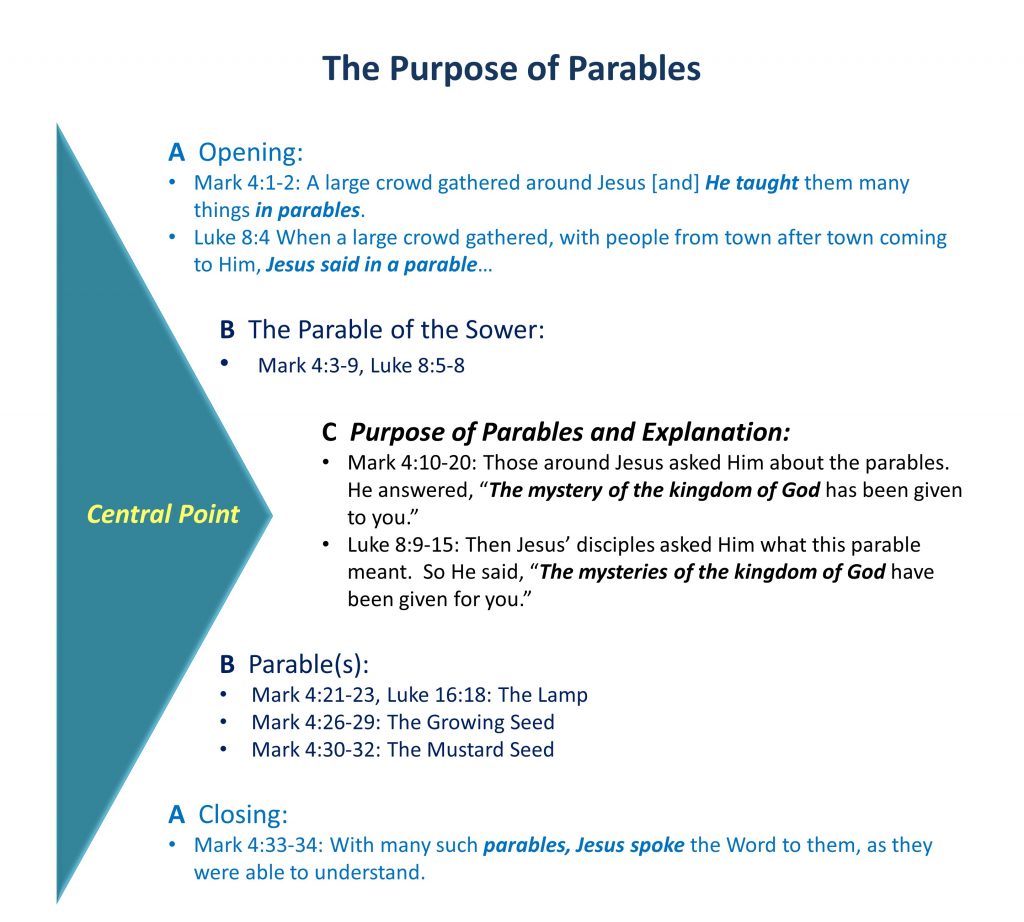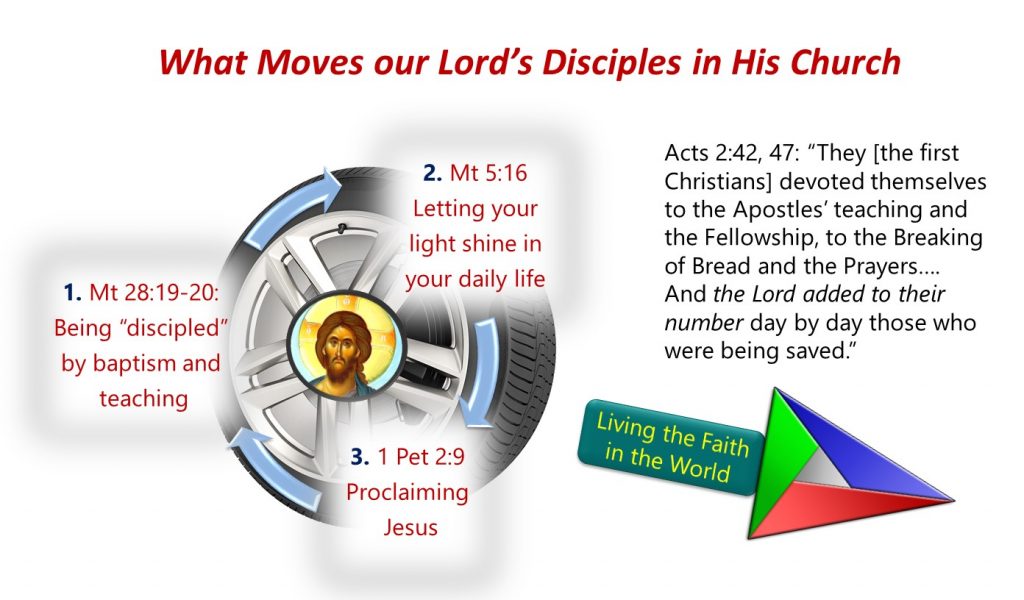Earlier, in both Mark 4 and Luke 8, Jesus told The Parable of the Sower (Mark 4:9, Luke 8:5-8) and then explained it (Mark 4:10-20, Luke 8:9-15). He did this to prevent a misunderstanding about “the mystery [Greek, musterion, mystery; Latin, sacramentum] of the kingdom of God” (Mark 4:11, Luke 8:10). On the heels of this, He tells the Parable of the Lamp (Mark 4:21-25, Luke 8:16-18). So this parable, which follows, is a further unveiling of the mystery of God’s kingdom, not about humans or their ways.
Mark arranges chapter 4 of his Gospel to emphasize Jesus’ parables are meant to reveal the mystery of God’s Kingdom to His people. Luke teaches this but doesn’t highlight it through his rhetorical structure.
The Parable of the Lamp
Read Mark 4:11, 21
- Jesus begins with a rhetorical question. What is the expected answer about putting a lamp under a basket instead of on a stand?
“Is a lamp brought”: The word “bought” is a translation of erchomai, “comes.” A more literal translation is “The lamp comes,” referring to a person, not an object. The Lamp is a Person who is the source of the light. Since this parable also follows The Parable of the Sower, where Jesus in the One sowing the seed, this can only mean He is the light in the parable.
As Jesus sows the Word in the preceding parable, so is He the Lamp which shines forth light. This is part of what He does within the mystery of the Kingdom of God. Referring to His incarnation, John wrote: “The true light who gives light to everyone, was coming into the world” (John 1:9)
Read Luke 8:16
- What does Luke state explicitly, which Mark implied?
Read Luke 8:17 (Mark 4:22)
Jesus repeats what He said using other words.
- If Jesus is the Light, what is to meant to happen to what He radiates?
Mark 4:22: For nothing is hidden [adjective], except to be revealed [verb, passive] and nothing is to be [verb, middle deponent = passive] concealed [adjective], except to come [verb, active] to light.
Luke 8:17: For nothing is hidden that will be [verb, middle] not revealed, and nothing is concealed that will be known [verb, passive] not, except to come [verb, active] to light.
These verses do not show who is doing the action; he is unnamed. The verbs are passive, except when attached explicitly to the light. All this is to show that the mystery of God’s Kingdom is not up to us to reveal and un-conceal. The coming to light is the Light’s doing.
Things are concealed, but for a purpose—so they might later be revealed at the proper juncture or time. The kingdom of God is hidden, but it cannot remain so. All the apparent secrets of the Gospel, Jesus’ identity and all His saving work, have as their goal the revelation of the God’s Kingdom.
- When Jesus was speaking, when would the hidden and concealed finally “come to light”?
- For us, when will “the mystery of Kingdom of God” come to light in all its glory?
Read Mark 4:23-24
- How does the mystery of the Kingdom of God come to someone? (Romans 10:17)
- What is someone supposed to be hearing? (Make 4:22)
- How does the metaphor “the measure you use” relate to “paying attention to what you hear”?
- What happens to the measures one uses, when related to hearing?
Understanding Mark 4:25 and Luke 8:18 in Its Setting
Remember this parable follows the Parable of the Sower. In it, Jesus highlights how faith is born and kept alive, with most of the sown seed dying in the various soils (representing different people).
So, why does the Gospel seed thrive in so few?
- The devil comes and takes away the word from someone (Mark 4:15, Luke 8:12).
- A lack of deep roots, which makes one vulnerable (Mark 4:17, Luke 8:13).
- The cares, riches, and pleasures of life choke out one’s faith (Mark 4:19, Luke 8:14).
The common denominator is these people receive the gift of faith (the seed) as a one-time act and but are not strengthened in it. Their faith is either snatched away, withers from starvation or is choked out.
The one who thrives after receiving the Word of God is the one who:
- Hears the Word (the preached Word).
- Is holding on to it (receives and keeps, not disregards it) in a noble and upright heart (which is what takes place by the received Word). “Holding” is a present tense, active verb, showing an ongoing action. The person continues in the ongoing activity of holding on to Jesus, which is receiving Him in the way He promises to come to His people: the preached Word and His Supper.
- All this produces a crop with patience; again, an ongoing activity. This patience is the opposite of all the sin-based responses of those whose faith died within.
Read Luke 8:18
- For the one who has more of what, what will be given to him? (Mark 4:22, Luke 8:17)
- For the one doesn’t have, or only he thinks he has, what will be taken from him?
God’s People as Salt and Light: Matthew 5:13-16
Matthew 5 begins: “When he saw the crowds, he went up on the mountain, and after he sat down, his disciples came to him. Then he began to teach them.”
Jesus teaches what we call the Beatitudes, “Blessed are the poor in spirit …” Next, Jesus describes His people as salt and light. To help us understand what He just taught, Jesus follows with, “Don’t think that I came to abolish the Law or the Prophets. I did not come to abolish but to fulfill” (Matthew 5:17).
To understand the Beatitudes and being salt and light as God’s people, we must understand Jesus’ fulfillment of the Old-Covenant Law.
Salt in the Old Covenant
Leviticus 2:13: You [the Old-Covenant priests] are to season all your grain offerings with salt. Do not ever leave the salt of the covenant of your God from your grain offerings. You must offer salt with each of your offerings.
All the Old-Covenant sacrifices pointed to Christ’s sacrifice for our salvation. He, then, fulfills not only the grain offering but also the salt. Just as food without salt is flavorless, the salt made the sacrificial bread more savory, pointing in a fuller way how the Messiah’s sacrifice will be acceptable to God.
Christ then makes us as salt, something worthwhile.
To Ezekiel, God delivered words to confront Israel’s unfaithfulness toward Him. Here, the lack of salt represents the lack of faith.
The word of the Lord came to me [Ezekiel] again: “Son of man, confront Jerusalem with her detestable practices. You are to say, ‘This is what the Lord God says to Jerusalem:… You were not washed with water or anointed; you were not rubbed with salt or wrapped in swaddling clothes.’” [Ezekiel 16:1-4]
This text points forward to Jesus being our salt, for He was the Firstborn wrapped in swaddling clothes for us (Luke 2:7). This verse is also prophetic in that is points forward to baptism (1 Peter 3:21) and confirmation (Corinthians 1:21; 1 John 2:27).
Read Matthew 5:13
- How does Jesus describe the Christian? In other words, what are we?
- If we are salt (not “work at being salt” or “try to become salt”), how did we become so?
Jesus is telling the Christian to be who you are, your identity, which comes from Him.
“lost its taste”: Greek, moraino, becomes foolish. Jesus must have been speaking to the Twelve in Aramaic. For here He uses wordplay. The Semitic root for “foolish” is tpl, which has two meanings: being foolish but also being tasteless. Just as salt that loses its savor and becomes tasteless and useless, so is the disciple who becomes foolish.
The Light of the Nations and the City on the Hill
Arise, shine, for your light has come, and the glory of the Lord rises upon you. Though darkness covers the earth and thick darkness over the people, the Lord will rise upon you, and his glory will appear over you. Nations will come to your light, and kings to the brightness of your dawn. [Isaiah 60:1-3]
In the last days, the mountain of the Lord’s house will be established as the highest of the mountains lifted above the hills. All nations will stream to it. Many peoples will come and say, “Come, let us go up to the Lord’s mountain, to the house of the God of Jacob. He will teach us his ways so we may walk in his paths.” [Isaiah 2:2-3]
Read Matthew 5:14-15
- What is the Christian?
- Where does he receive his identity as “light” and what does he become part of?
- If we are a city set on a hill, what is impossible for us to do as long as we are that city on the hill?
Read Matthew 5:16
- If Jesus is our Light, what then does let your light shine mean?
- For someone to “give glory” to the Father in heaven means what?
1 Peter 2:9: But you are a chosen race, a royal priesthood, a holy nation, a people who are God’s own possession so proclaim the wonderful deeds of him who called you out of darkness into his marvelous light.
Evangelism involves the interaction of words [proclaiming Jesus] and deeds [let your light shine] coming together in one’s daily vocations.




